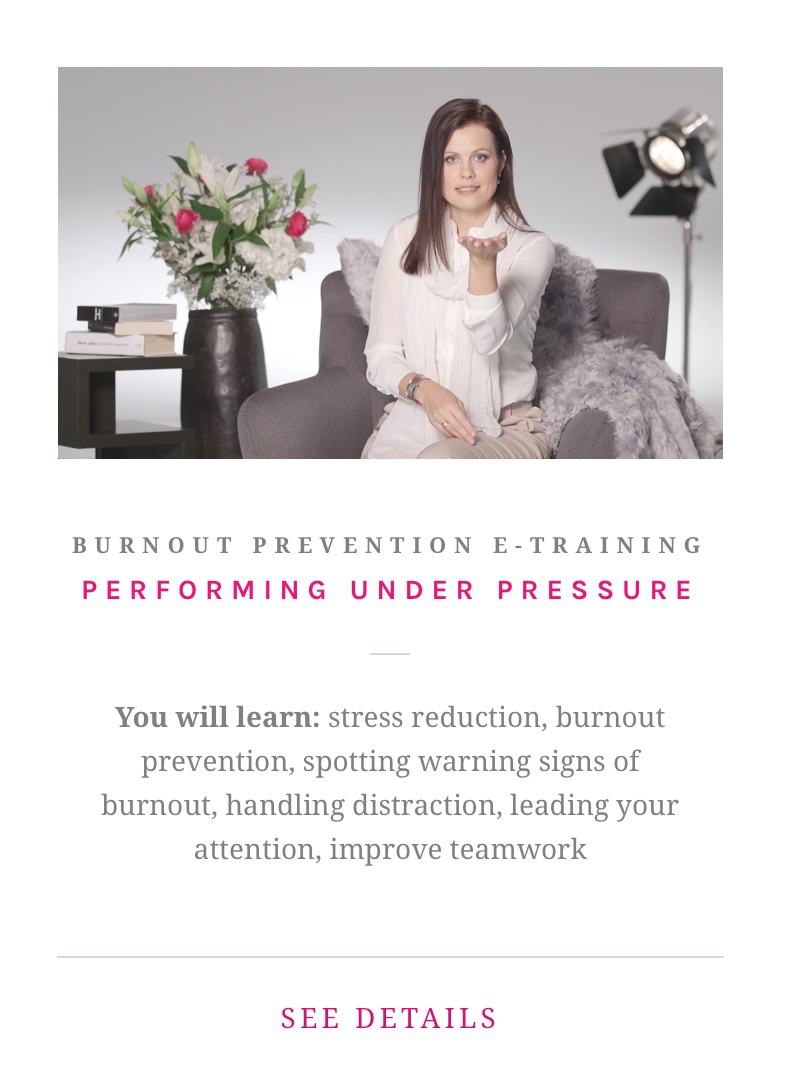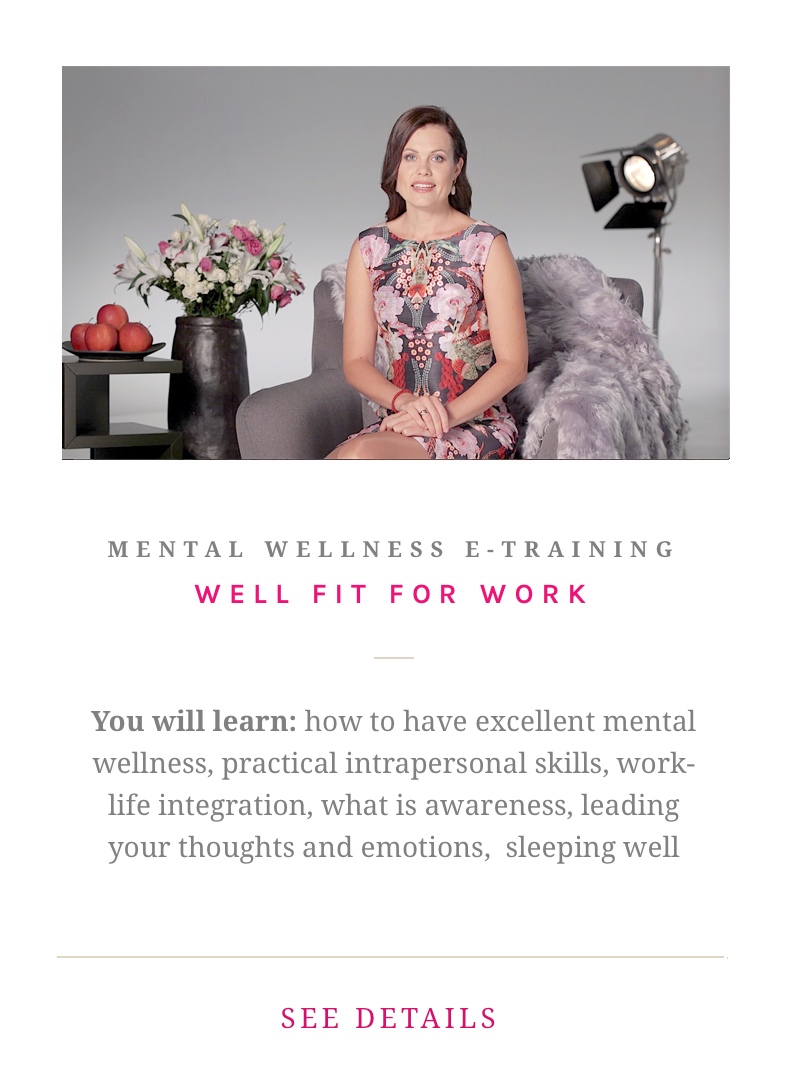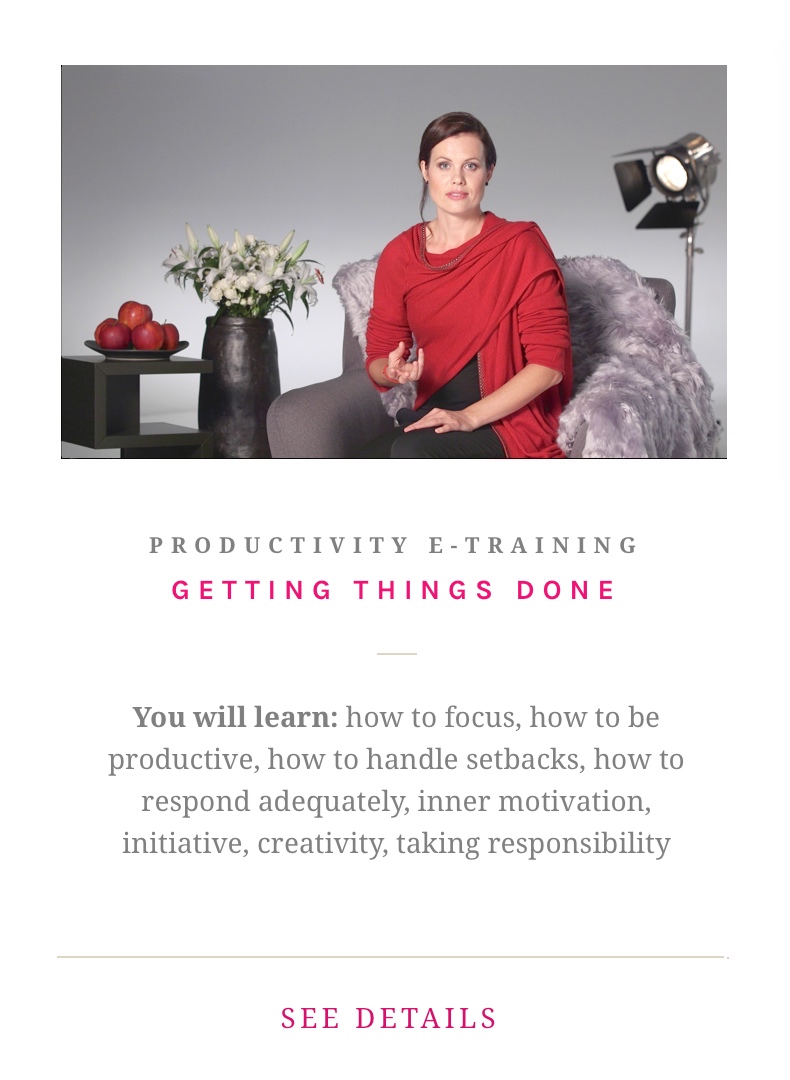Upgrading intrapersonal skills in the face of rising AI and automation
The perceived threat that Artificial Intelligence (AI) and automated process’ are set to put millions of employees out of work has people falsely believing that in order for them to succeed they themselves need to become more machine-like.
We feel we somehow need to be able to think quicker and multitask more, take fewer breaks and downtime, be constantly on, and never tire. Is this a realistic view to improve human capacity in the era of technology?
The shift in the job market
As workplaces are set to become ever more automated, with manual jobs set to decline, we will see an increase in demand for understanding what makes us as humans special.
The McKinsey Global Institute’s report “Jobs lost, jobs gained: Workforce transitions in a time of automation”, published in January 2018, predicted that by 2030, 75 to 375 million workers worldwide (that’s 3 to 14% of the total global workforce) will need to switch occupations or re-skill. Back then it was a theory, today we see that new AI solutions shift how we work in real-time.
Sooner or later workers in almost every industry will be affected by automation and AI, hence the importance of re-skilling to both change and adapt. Such adaptation will require gaining education in social and emotional skills, creativity, high-level cognitive capabilities and above all intrapersonal skills that will make future employees immune to results automation.
The above-mentioned skills are mostly not physical, but inner skills; all such intrapersonal skills are awareness-based and can be developed through trainings that address the improvement of our mental and cognitive abilities.
Intrapersonal skills as invaluable assets
Our intrapersonal skills are invaluable companions that accompany us throughout our lifelong journey. While theoretical knowledge is informative and enlightening, it is through practice that all our inner skills truly come alive.
Only having practical intrapersonal skills will enable us to navigate the twists and turns of life, especially during the most trying times.
While the theoretical understanding lays the groundwork and provides a conceptual framework, it is the application and hands-on experience that empowers us to effect the transformative shifts we seek.
When we face adversity and difficulties, mere theoretical knowledge often falls short.
It is the practical application of our intrapersonal skills that grants us the dexterity and adaptability necessary to overcome obstacles, deal with stress, burnout, mental health issues and emerge stronger on the other side.
Humans should not imitate machines
Arianna Huffington sums it up perfectly when she states, “We are working in a world where to be constantly "switched on" is rewarded, where burnout equals success, where we forget to recharge ourselves, but not our phones.”
The World Health Organization (WHO) has long ago predicted that by the year 2030, the most inhibiting workforce illnesses will be problems associated with individual mental health.
Stress-related disorders, burnout, depression, anxiety disorders, adjustment disorders and addictions are already prevalent in our society and have become epidemic. If we don’t correct people’s skills to manage inner tensions and signals do not measure up, as a result, they become disorganized.
This means that people who are physically healthy will become essentially useless in terms of their ability to perform at work, becoming gradually more and more inhibited by their psychological inner status that may already in its severity have crossed the delicate threshold where a psychiatrist would call it an illness.
Stress, burnout and depression affect not only our ability to work but also reduce our capability to take initiative, be creative, innovate and enjoy life.
While computers and automated systems have developed at an incredible pace, our inner sphere on the other hand has remained on the same inner subconscious automation – reliant made for millennia.
The speed we feel comes from mind-wandering. For example, when you try to focus or listen to someone, you may have noticed that you start to think about completely non-topic-related issues.
The very instant you notice your mind has wandered you also have a glimpse of awareness. It is your own awareness that enables this noticing.
The very act of noticing shows that you are actually already behind these thoughts, aware of their existence and not identified with them. After all, you are not your thoughts.
This notion goes a long way because you realize that even if your thoughts race, you do not. You and thoughts are separate phenomena and this needs to be discovered practically.
We shouldn’t aspire to become computer-like in terms of our thinking and acting, instead, we need to upgrade our know-how and understanding about our inner functions and resources.
The problem lies in that we haven’t been taught how to utilize our own internal resources to obtain optimum human capability. In actual fact, most of us still lack intrapersonal education and practical and applicable intrapersonal skills that would secure our mental wellness and development.
Re-inventing our human capacity
Knowledge about our own intrapersonal skills can unlock our internal potential, furthering our capacity to function at optimal mental and emotional levels.
As we have stated before, learning intrapersonal skills can be likened to learning to read, both open up new opportunities and knowledge, broaden and deepen our understanding in multi-dimensional ways.
Using intrapersonal skills, we are able to relearn how to learn.
This is not as alien a concept as it might first appear. Children learn in exactly this way, by using awareness they learn thousands of new things before they can talk and they learn in a much faster way than grown-ups are able to.
Purposeful use of awareness essentially speeds up the learning process. Compared to traditional education systems where we are encouraged to prefer the mental instrument and learn things by constant mental repetition.
Awareness-based intrapersonal skills are for example noticing, comparison/ differentiation, holding focus or attention at the same object as long as needed.
Learning intrapersonal skills allows us to further regulate our inner functions and prevent stress, burnout and even more serious mental health problems, resulting in us staying healthier, happier and more efficiently productive for longer.
Arming ourselves with such skills is particularly crucial in relation to AI/machine thinking (like ChatGPT which is thinking faster than any human being) and automation being ever increasingly implemented into our daily lives and workplaces.
Practice enhances our intrapersonal skills, refines our abilities, and instills within us a resilience that cannot be learned solely through theory. It also gives us access to creativity and insights.
During challenging times, when uncertainty looms, it is our well-practiced inner skills that serve as steadfast companions, guiding us forward, and empowering us to make the necessary shifts and adjustments.
Intrapersonal skills that are cultivated through practice become ingrained within us, shaping our identities and permitting us to handle calmly any situation.
Fully utilizing what we already have as humans
Our experience of the world and our quality of life is created by our ability to become aware of it.
When observed, we are in real contact with our actual surroundings about five percent of the time. The other 95% of the time we are internally disconnected, attending to our thoughts, memories, feeling something, etc.
What this means is that we are actually mostly on autopilot mode, half asleep and thus the current AI systems already easily outperform us in many areas (from writing a poem to summing up long scientific papers). Those systems also combine known thoughts very fast and in a grammatically correct way.
Is the combination of known something new? First, it appears so, but true innovation is based on creativity and insights not on automation.
Today most of our actions and choices are dictated by our own subconscious automated events as our emotions and thoughts that pop up in reaction to triggers. The fact is, our inner reactivity kills productivity, employee engagement and innovation and makes our minds to wander.
As humans use only about 5% of their awareness, we can upgrade ourselves a lot. The link between greater use of awareness and enhanced contact with our base reality should be acknowledged more.
By using awareness more, we would be able to decrease the level of our own internal autopilot mode and use more of our intuition, insight and creativity that are based on awareness.
When we learn intrapersonal skills, we will be less machine-like and use more of our true innate human capabilities. When we do that, we can become truly innovative, not only think outside of the box, but also be creative without any limitations. We should strengthen the very skills that remain out of reach of algorithms. This is our human advantage.
Awareness as an alternative to our mental instrument
According to the author Ingvar Villido who promotes practical consciousness, your awareness can be best described as the link between you – the one who notices and the object of your observation. When you notice (being the witness) what you use for observation, you find your own awareness.
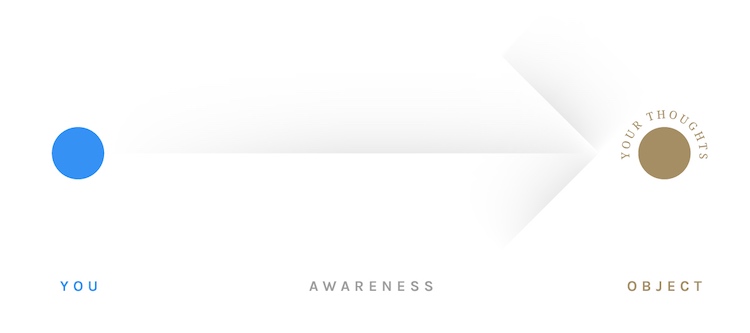
An illustration of the arrow of awareness between you and the object information is shared with the kind permission of Ingvar Villido. Illustration design Jürgen Salenbacher.
Do an experiment and observe something and notice: Which comes first, becoming aware of the object or your thoughts about the object?
You will discover that, even if for a millisecond, you first become aware of the object, then the rest follows. What if you could prolong that millisecond? Experiment a little.
We as humans do not need faster thinking, as our thinking cannot be sped up, nor do we need multitasking, as studies have shown it actually makes us less productive.
What we need is to become masters of our own awareness, as it is our most powerful asset to lead both our internal and external processes.
Awareness is a key to keeping us well
While we still are relatively innovative on a technological level, the same cannot be said when it comes to dealing with our approach to mental wellness.
Our attitude towards mental health is still very much reactive, with the main focus on illnesses and cures. We have to begin to approach mental health in a more proactive manner.
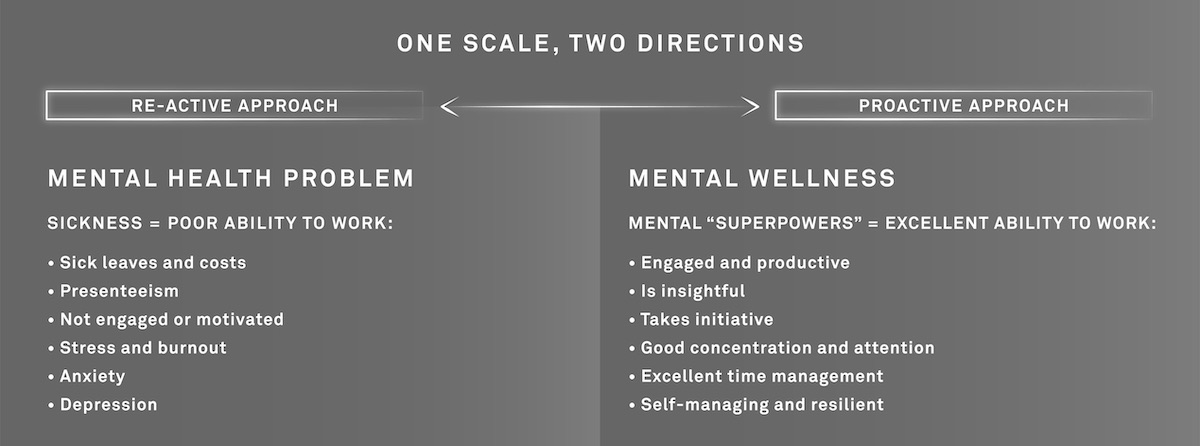
Situation without intrapersonal skills vs with intrapersonal skills. Illustration by Dr. Helena Lass, illustration design by Risto Bakhoff.
If we compare this to machines, our current approach is like stopping all innovation and only focusing on fixing outdated technical solutions. No one would see this as progress in the case of technology, however, we have been too focused on fixing problems instead of finding preventative solutions.
We see an opportunity to re-invent the approach to mental wellness and turn it from a reactive approach into a proactive learning path. That is why we have been pushing the mind health revolution.
We can learn the intrapersonal skills we need for mental wellness proactively, the same way we currently try to teach self-learning systems like self-driving cars to foresee different possible scenarios that might happen.
Our co-founder Dr. Helena Lass claimed back in 2018 in her scientific paper, "Developing Intra-Personal Skills as a Proactive Way to Personal Sustainability - The Preventative Side of the Mental Health Equation", that a proactive approach to mental health and intrapersonal skills has been missing and is badly needed.

This scientific paper by Dr. Helena Lass was published globally by Routledge and is summing up paving the path for systematic proactive mental wellness.
Ppromoting and explaining this new systematic intrapersonal skills based mental wellness approach will enable humans to dominate over the machines in the future.
It’s time we began to make serious concessions to try to begin to notice how we can improve the mental shape of our people, in order to come up with creative innovations to keep this planet and ourselves alive in a sustainable manner. For that we cannot rely on machines, we need to learn to rely on ourselves.
In that sense developing apps that tell us when to sleep, eat and be active is perhaps a way of losing control over our lives. We aim to replace our own awareness and noticing with automated apps. Is this really wise in the face of acquired helplessness?
Instead of giving control to apps, we should be more aware both in a direct sense by guiding where our own awareness is and in an indirect sense by understanding the consequences of our actions to our lives, society and planet.
If we do so and become mentally fit to lead our lives we can use technology to help us to clean up the mess we have created. Otherwise, our true luxuries of silence, pure natural water and unspoiled nature will be lost as a result.

In nature we can spot silence, similar silence is within us. It is a recourse that we have forgotten and need to re-discover.
King of machines or machine kings?
If we as human beings want to maintain the upper hand over machines, we need to re-learn how we lead our lives.
Several leading AI experts have stated that we should be referring to ‘Artificial Intelligence’ as ‘machine learning’ and ‘machine thinking’ instead. All leading experts in the field agree that self-aware machines are still a thing of science fiction. And even their self-awareness is not awareness of awareness itself.
It is surely only a matter of time before we can write and program ever more complex self-learning algorithms. Complexity however is not self-awareness.
Historian Yuval Noah Harari highlights exactly this by saying, “What we are actually talking about here is the decoupling of intelligence from consciousness. Many people, especially in the business of creating artificial intelligence, they tend to confuse intelligence and consciousness, which is understandable as in human beings the two go together… over the last 60 to 80 years there has been immense progress in computer intelligence, there has been exactly zero development in the computer consciousness. In the 1940’s the first computers had zero consciousness and today they have zero consciousness, and we do not see signs of computers gaining any kind of consciousness anytime soon.”
Kate Darling from MIT Media Lab is perhaps one of the few experts currently investigating the relationship between robots and humans and how we act towards each other in what we consider as normal behavior in our society. She has pointed out that, “the question of whether robots can actually change people’s long-term behavioral patterns, be it in positive or negative ways, is unanswered.” She encourages us to observe how machines influence us.
We often accept new technology without noticing its influences on our daily lives. Smartphone and social media dependency are good examples of how we have already given away a lot of control over our own decisions.
If we do not learn how to direct our own awareness, we will give algorithms and machines more and more control over our lives, as we often prefer to take the seemingly easier route, which is in a closer look a parasitic automatic reaction that pops up as a response to triggers.
This attitude has been acquired by us and is not an ‘inevitable’ human behavior. Much like the Disney movie ‘Wall-e’, where humans have long destroyed Earth and cruise around in a spaceship in comfy chairs that automatically feed and entertain them. And this again is not very far from the scenario of ‘The Matrix’.
When we do not discover what makes us as humans ‘human’, what is beyond automation, we run the risk of finding ourselves in acquired helplessness and end up running on autopilot mode, without noticing the consequences our own actions cause to ourselves and our planet.
Future Worries Present Solutions
Workplaces of the future will see humans, machines and robots working alongside one another that will one day be considered commonplace. The uncertainty of today is that we cannot fathom what this will be like, and quite naturally we fear the worst.
What we can do in preparation is to begin to re-skill ourselves with valuable tools that will enable us to be more creative, innovative, perceptive, intuitive, adaptable, and more aware. These capabilities will help us to adjust and find meaning again and again.
When businesses and organizations start training their employees in awareness-based intrapersonal skills, they will be able to survive and compete in the future, whatever challenges and problems present themselves.
|
The future will be considerably brighter if we begin to place as much importance on learning about ourselves as humans instead of trying to figure out the next innovative tech solution.
It is ironic – learning to be less automated and computer-like will open up new skills for humans. We should automate tech solutions and free ourselves from learned subconscious automation.
This is an opportunity for us to rise to a totally new evolutionary level. If we use more of our own awareness, we are able to foresee the results of releasing certain technologies that otherwise would have catastrophic consequences.
People with good use of awareness and intrapersonal skills are always more ethical as they can clearly see the results of their own actions and how those influence others around them.

Excellent intrapersonal skills allow smooth communication, ethical work culture, good collaboration and also improve employee engagement.
Conclusion
Automation of the jobs we don’t like doing is a good thing and will allow us to reduce bureaucracy and the need to work in hazardous environments etc.
Localized robot factories and 3D printing can reduce the need for global transportation, meaning less (fossil) energy usage, waste and pollution. However, automation will never reduce our desires or give meaning to our lives. For managing this we need intrapersonal skills that lead to good mental wellness and improved human capacity.
Maybe it is time to reorganize that our internal needs of connection, recognition, approval, etc, can be satisfied without external compensation through consumerism and power-play.
Machines and AI systems should serve us and if we properly prepare ourselves we can create a better future – a humane inclusive future aided by AI and machines, whilst we still have the upper hand.
This blog post is written by Kaur Lass


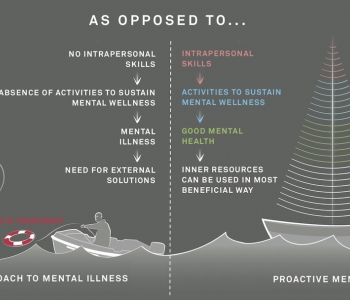
.jpg)
